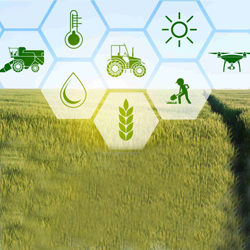Dep.Agricultural Extension and Education - Razi University

Department of Agricultural Extension and Education
About
Head of Department
Faculty Members
Programs
Academic Facilities
Contact Us
Department of sustainable agricultural education and extension
1. History
The sustainable agricultural education and extension department was founded in 1994 in agricultural college and started its activities with admission of 32 students in the field of agricultural education. Then in 1995, the department had 34 students. In 1997, the Sustainable agricultural education and extension department moved to current location (fourth floor of the main building of college). The department established a Master's degree in rural development in 1997 and for the first time in Iran, attracting 4 students through postgraduate education. The department in 2007, for the first time in the master's degree in agricultural education and extension, attracted 9 students, and in 2010, four PhD students were enrolled in the field of agricultural development. The Ph.D. in agricultural education and extension was approved in 2009, and for the first time, 5 students were admitted. Currently 7 faculty members and one educational assistant are engaged in department.
2. Academic members and research interests
The sustainable agricultural education and extension department currently has 10 faculty members (1 professor, 1 Associate Professors and 5 Assistant Professor), and also has 1 Educational Assistant.
3. Educational purposes
Department as the university's interface with agricultural community educates students specializing in rural development, agricultural education, and extending modern farming practices in rural community. Training facilitators in rural and agricultural development is the main goal of Bachelor of Science courses in the department also acquire skills in producing educational content and materials in agricultural education is the major educational goals in this courses. Development of new agricultural education methods with emphasis on practical, entrepreneurial, group based activities, service learning and participatory learning and action is the main educational goal of the Agricultural education field in department. As well as providing university services in the field of agricultural education, research and academic services is part of the department’s goals. Engagement of students in real entrepreneurial farming activities for daring and preparing them for work in the community is a central goal of education in this department.
4. Research targets
Training of researchers in field of sustainable rural and agricultural societies is one of most important goals of the departments. Collaborative research efforts with other departments, research institutes and centers to providing leadership in interdisciplinary research and education through intercollegiate programs. The research priorities of the department are mainly focused on solving the problems associated with the management of Agricultural and rural development, agricultural education. The faculty members of the department with cooperation with other related organization such as agriculture, rural cooperation, rural development, perform many research project base on the main problems of organizational executive affairs. Also in in format of dissertation and thesis the research beyond sustainable rural development and sustainable agricultural development, education of agriculture and related topics are done. Participatory researches and Demand-driven researches is dual purpose strategies in the department.
The main areas of research in this department are as follows:
• Sustainable agricultural development: education, planning, entrepreneurship in agriculture, drought and agriculture, social problems and agricultural development, agricultural development and climate changes, research in education of entrepreneurship
• Sustainable rural development with emphasis on, participation, environment, renewable energies, social capital, planning, rural service centers, Indigenous knowledge and rural anthropology
• Agricultural education: adult learning, behavioral matters, educational methods,
• Agricultural extension: innovation systems and adaptation, service learning,
• Agricultural entrepreneurship researches
5. Educational and research facilities
The department has educational technology laboratory.
1. History
The sustainable agricultural education and extension department was founded in 1994 in agricultural college and started its activities with admission of 32 students in the field of agricultural education. Then in 1995, the department had 34 students. In 1997, the Sustainable agricultural education and extension department moved to current location (fourth floor of the main building of college). The department established a Master's degree in rural development in 1997 and for the first time in Iran, attracting 4 students through postgraduate education. The department in 2007, for the first time in the master's degree in agricultural education and extension, attracted 9 students, and in 2010, four PhD students were enrolled in the field of agricultural development. The Ph.D. in agricultural education and extension was approved in 2009, and for the first time, 5 students were admitted. Currently 7 faculty members and one educational assistant are engaged in department.
2. Academic members and research interests
The sustainable agricultural education and extension department currently has 10 faculty members (1 professor, 1 Associate Professors and 5 Assistant Professor), and also has 1 Educational Assistant.
3. Educational purposes
Department as the university's interface with agricultural community educates students specializing in rural development, agricultural education, and extending modern farming practices in rural community. Training facilitators in rural and agricultural development is the main goal of Bachelor of Science courses in the department also acquire skills in producing educational content and materials in agricultural education is the major educational goals in this courses. Development of new agricultural education methods with emphasis on practical, entrepreneurial, group based activities, service learning and participatory learning and action is the main educational goal of the Agricultural education field in department. As well as providing university services in the field of agricultural education, research and academic services is part of the department’s goals. Engagement of students in real entrepreneurial farming activities for daring and preparing them for work in the community is a central goal of education in this department.
4. Research targets
Training of researchers in field of sustainable rural and agricultural societies is one of most important goals of the departments. Collaborative research efforts with other departments, research institutes and centers to providing leadership in interdisciplinary research and education through intercollegiate programs. The research priorities of the department are mainly focused on solving the problems associated with the management of Agricultural and rural development, agricultural education. The faculty members of the department with cooperation with other related organization such as agriculture, rural cooperation, rural development, perform many research project base on the main problems of organizational executive affairs. Also in in format of dissertation and thesis the research beyond sustainable rural development and sustainable agricultural development, education of agriculture and related topics are done. Participatory researches and Demand-driven researches is dual purpose strategies in the department.
The main areas of research in this department are as follows:
• Sustainable agricultural development: education, planning, entrepreneurship in agriculture, drought and agriculture, social problems and agricultural development, agricultural development and climate changes, research in education of entrepreneurship
• Sustainable rural development with emphasis on, participation, environment, renewable energies, social capital, planning, rural service centers, Indigenous knowledge and rural anthropology
• Agricultural education: adult learning, behavioral matters, educational methods,
• Agricultural extension: innovation systems and adaptation, service learning,
• Agricultural entrepreneurship researches
5. Educational and research facilities
The department has educational technology laboratory.
Head of Department: Amirhossein Alibeigi
Tel: 98+ (83) 38330909
Email: baygi1 [at] razi.ac.ir
Tel: 98+ (83) 38330909
Email: baygi1 [at] razi.ac.ir
| Full Name | Degree | Programs | |
| Amirhossein Alibeigi | Associate Professor | Agricultural education | baygi1@razi.ac.ir |
| Ali Asghar Mirakzadeh | Assistant professor | Sustainable Agricultural development planning/ sustainable agricultural extension and education | Mirakzadeh@razi.ac.ir |
| Farahnaz Rostami Ghobadi | Assistant professor | Sustainable Agricultural development planning/ Agricultural extension and education | fr304@yahoo.com |
| Kiumars Zarafshani | Professor | Agricultural education and extension/ entrepreneurship in agriculture | zarafshani2000@yahoo.com |
| Laleh Salehi | Assistant professor | Innovation and relationship in Agriculture | lsalehi@ut.ac.ir |
| Shahpar Geravandi | Assistant professor | Sustainable Agriculture | sh.geravandi1@gmail.com |
| Zahra Athari | Assistant professor | Education and participation in natural resources management | Z.athari@gmail.com |
|
|
|
|
|||||
|---|---|---|---|---|---|---|---|---|
| Agricultural Extension |  |
 |
 Chart |
|||||
| Rural Development |  |
 Chart |
 |
|||||
| Sustainable Agricultural Education and Environment |  |
 |
 Chart |
|||||
| Sustainable Agricultural Extension and Education |  Chart |
 |
 |
|||||
| Sustainable Agricultural Extension and Natural Resources |  |
 Chart |
 |
| Laboratory Name | Equipment |
|---|---|
| Educational Technology Laboratory | Audio and Visual Equipment such as Overhead Projector, Digital Camera, Film Strip, Scanner, Slide, Smart Board, Video Projector |
Address: Faculty of Agriculture and Natural Resources, Imam Highway, Kermanshah, Iran
Tel: 98+ (83) 38330909
Email:
Tel: 98+ (83) 38330909
Email:
